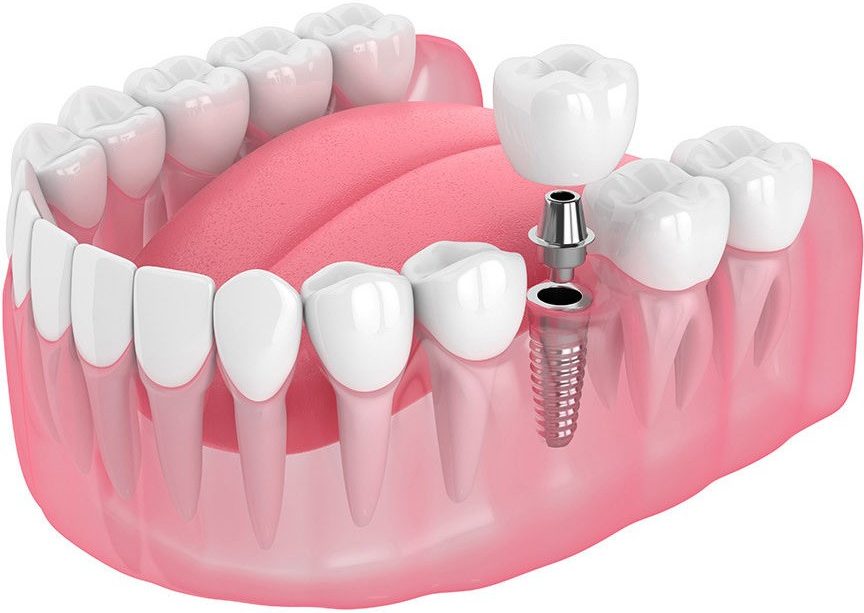The Complete Guide to Dental Implants: What You Need to Know Before Getting One

Dental implants have revolutionized modern dentistry, offering a permanent and reliable solution for individuals with missing teeth. Whether you’ve lost a tooth due to injury, decay, or gum disease, dental implants can restore both your smile and your confidence. However, before making the decision to get one, it’s essential to understand what dental implants are, how they work, and what factors to consider. This comprehensive guide will walk you through everything you need to know about dental implants so you can make an informed choice.
What Are Dental Implants?
Tandimplantat are artificial tooth roots made of biocompatible materials like titanium that are surgically placed into the jawbone. Once implanted, they serve as a sturdy foundation for replacement teeth such as crowns, bridges, or dentures. Unlike traditional dentures or bridges, dental implants mimic the natural structure of teeth, providing stability, durability, and functionality.
The primary components of a dental implant include:
- The Implant Post : A screw-like structure inserted into the jawbone.
- The Abutment : A connector piece that attaches the implant post to the replacement tooth.
- The Crown (Prosthesis) : The visible part of the implant, designed to look and function like a natural tooth.
Why Choose Dental Implants?
1. Long-Term Solution
Unlike other restorative options, dental implants are designed to last a lifetime if properly cared for. With proper oral hygiene and regular dental check-ups, implants can remain functional for decades.
2. Improved Appearance
Dental implants blend seamlessly with your natural teeth, enhancing your smile and facial aesthetics. They prevent bone loss in the jaw, which can otherwise lead to a sunken appearance over time.
3. Enhanced Comfort
Because implants fuse with the jawbone, they eliminate discomfort often associated with removable dentures. There’s no slipping, clicking, or irritation—just a secure fit.
4. Better Oral Health
Implants don’t require altering adjacent teeth, preserving more of your natural tooth structure compared to bridges. Additionally, they reduce the risk of gum disease by filling gaps where bacteria could accumulate.
5. Improved Speech and Functionality
Missing teeth can affect speech clarity and chewing efficiency. Dental implants restore full functionality, allowing you to eat, speak, and smile with confidence.
How Do Dental Implants Work?
The process of getting dental implants involves several stages spread over a few months. Here’s a step-by-step breakdown:
Step 1: Initial Consultation
Your dentist will evaluate your oral health, take X-rays, and discuss your medical history to determine if you’re a good candidate for implants. Factors such as jawbone density, gum health, and overall health play a crucial role in eligibility.
Step 2: Implant Placement Surgery
During this outpatient procedure, the implant post is surgically inserted into the jawbone under local anesthesia. Over the next three to six months, osseointegration occurs—a process where the implant fuses with the surrounding bone tissue.
Step 3: Abutment Placement
Once osseointegration is complete, a second minor surgery may be required to attach the abutment. This component serves as the link between the implant post and the prosthetic tooth.
Step 4: Crown Attachment
After the gums heal around the abutment, your dentist will create a custom crown that matches the color, shape, and size of your existing teeth. The final restoration is then attached, completing the process.
Who Is a Good Candidate for Dental Implants?
Not everyone is an ideal candidate for dental implants. To qualify, patients must meet certain criteria:
- Adequate Jawbone Density : Sufficient bone volume is necessary to support the implant. If there’s insufficient bone, a bone graft may be recommended.
- Healthy Gums : Gum disease must be treated before proceeding with implant surgery.
- Good Overall Health : Conditions like uncontrolled diabetes or autoimmune disorders can interfere with healing.
- Non-Smokers : Smoking increases the risk of implant failure due to poor blood flow and delayed healing.
If you’re unsure whether you’re a suitable candidate, consult with a qualified implant dentist for a thorough evaluation.
Benefits vs. Risks of Dental Implants
Benefits
- Natural-looking results
- Improved bite force and chewing ability
- Prevention of bone loss
- No damage to neighboring teeth
- Longevity and reliability
Risks
While dental implants boast a high success rate (over 95%), potential risks include:
- Infection at the implant site
- Nerve damage leading to numbness or pain
- Implant rejection or failure
- Sinus issues (for upper jaw implants)
Choosing an experienced and reputable dentist significantly reduces these risks.
Cost of Dental Implants
One common concern among patients is the cost of dental implants. While they tend to be more expensive upfront than alternatives like dentures or bridges, their longevity makes them cost-effective in the long run.
Factors influencing the cost include:
- Number of implants needed
- Type of restoration (crown, bridge, etc.)
- Geographic location
- Additional procedures (e.g., bone grafts)
On average, a single dental implant can range from $1,000 to $4,000. Many dental offices offer financing plans or payment options to make treatment more affordable. Some insurance policies also cover part of the cost, so it’s worth checking with your provider.
Caring for Your Dental Implants
Proper care is vital to ensure the longevity of your dental implants. Follow these tips to maintain optimal oral health:
- Brush Twice Daily : Use a soft-bristled toothbrush and non-abrasive toothpaste to clean your teeth and implants.
- Floss Regularly : Special interdental brushes or floss threaders can help remove plaque around the implant area.
- Visit Your Dentist : Schedule routine check-ups every six months for professional cleanings and evaluations.
- Avoid Hard Foods : Chewing on hard objects like ice or nuts can damage the crown or abutment.
- Quit Smoking : Tobacco use compromises healing and increases the risk of complications.
By adopting these habits, you can enjoy your dental implants for years to come.
Alternatives to Dental Implants
While dental implants are considered the gold standard for tooth replacement, they aren’t the only option. Depending on your needs and budget, you might consider:
- Dentures : Affordable but less stable than implants.
- Bridges : Require altering adjacent teeth but provide a fixed solution.
- Resin-Bonded Bridges : Less invasive but not as durable as implants.
Each alternative has its pros and cons, so discuss your options with your dentist to find the best fit for your situation.
Frequently Asked Questions About Dental Implants
Q1: Does the Procedure Hurt?
A1: Most patients report minimal discomfort during and after the procedure. Local anesthesia ensures pain-free surgery, while over-the-counter pain relievers can manage any post-operative soreness.
Q2: How Long Does Recovery Take?
A2: Full recovery typically takes three to six months, depending on individual healing rates and whether additional procedures like bone grafting were performed.
Q3: Can I Get Multiple Implants at Once?
A3: Yes, multiple implants can often be placed during a single visit, though the specifics depend on your case.
Q4: Will My Insurance Cover It?
A4: Coverage varies by policy. Some plans partially cover implants, while others classify them as cosmetic and exclude them entirely.
Conclusion
Dental implants represent a cutting-edge solution for replacing missing teeth, combining aesthetics, functionality, and durability. By understanding the procedure, costs, benefits, and maintenance requirements, you can decide if they’re right for you. Remember, choosing a skilled and experienced implant dentist is key to achieving successful outcomes.
If you’re ready to reclaim your smile and improve your quality of life, schedule a consultation with a trusted dental professional today. With proper planning and care, dental implants can transform your oral health—and your confidence—for years to come.








